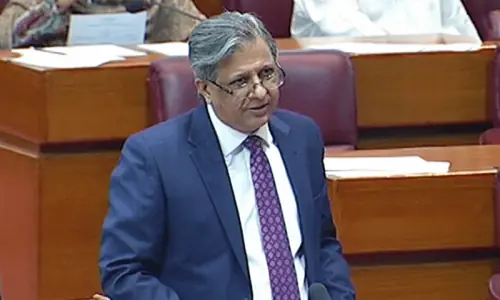ISLAMABAD: Pakistan Peoples Party (PPP) secretary general and former senator Farhatullah Babar has expressed his concerns over the reported remarks of Chief Justice of Pakistan (CJP) Umar Ata Bandial regarding “self-serving legislation” by the parliament, suggesting the top judge “to avoid sweeping remarks”.
“Honourable CJP implying that parliament is making self-serving laws throws dim light on the parliament. Respectfully, avoid sweeping remarks. Constitution be so interpreted that it advances powers of all democratic institutions, not of the honourable court alone,” wrote Mr Babar in a series of tweets on Saturday.
The reaction from the key PPP office-bearer came a day after newspapers reported CJP’s observation during the hearing of a petition filed by Pakistan Tehreek-i-Insaf chairman and former prime minister Imran Khan, through his counsel Khawaja Haris Ahmed, to recent amendments to the National Accountability Ordinance (NAO) on Friday.
Farhatullah wants Constitution be interpreted to advance powers of all democratic institutions
The CJP had wondered whether the parliament could be expected to make a “self-serving legislation” when it’s in a “transitory period and the elections have to be held”.
“We are the guardians of the Constitution and it is not a joyful enterprise for the courts to do legislation instead or show over activism. But we have to protect the Constitution, the constitutional machinery and the rule of law,” the CJP had reportedly observed. The case is being heard by a three-judge bench headed by the CJP and comprising Justice Syed Mansoor Ali Shah and Justice Ijazul Ahsan.
“The sweeping remarks that the accountability law by parliament is self-serving would be welcomed if everyone (including generals and judges) are subjected to same uniform law. Respects, but it’s no glory when those exempted from uniform accountability law call the law self-serving,” Mr Babar tweeted.
The former senator added: “With respects, when the nominees of honourable CJP for elevation were rejected by majority of Judicial Commission, no member [of the] parliament ever implied that nominations were self-serving. We believe that both nominations and their rejection were honest. Exceptional times indeed for everyone.”
On July 27, the National Assembly unanimously adopted a resolution seeking the formation of a special parliamentary committee to carry out judicial reforms after heads of the ruling coalition parties, including Prime Minister Shehbaz Sharif, launched a tirade against the judiciary over the decision of a three-judge Supreme Court bench, which overruled Punjab Assembly’s deputy speaker’s ruling and removed the premier’s son, Hamza Shehbaz, as the chief minister.
The resolution seeking the committee’s formation had been read out by Law Minister Azam Nazeer Tarar and was supported by the small opposition in the house after PPP chairman and Foreign Minister Bilawal Bhutto-Zardari in his hard-hitting speech had held the judiciary responsible for the state of democracy in the country and accused it of validating all the military takeovers in the past.
Before passage of the resolution, Prime Minister Shehbaz Sharif had accused the judiciary of having “double standards” in treating different political parties.
Published in Dawn, August 21st, 2022





























